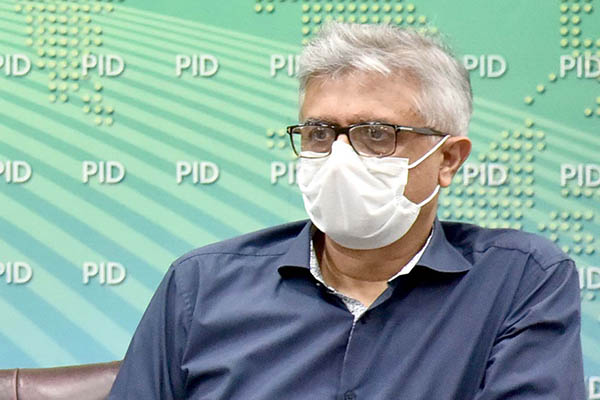
Courtesy PID
Special assistant to the P.M. on Health urges public to adopt preventative measures as burden on hospitals mounts
The second wave of the novel coronavirus in Pakistan has reached areas of the country that remained unaffected by the pandemic during the first wave, Special Assistant to the P.M. on Health Dr. Faisal Sultan warned on Wednesday, as he urged the public to exercise care to prevent loss of lives and livelihoods.
Addressing a press conference in Islamabad, he noted that the country was recording a surge of new cases daily, and was also experiencing mounting casualties, increasing the burden on the country’s healthcare infrastructure. “I urge everyone to strictly adhere to SOPs,” he said, reiterating that this included wearing masks, avoiding crowded places, washing hands with soap often, ensuring all rooms were well ventilated and that a distance of six feet was maintained between people.
Referring to Pakistan’s vaccine procurement strategy, Dr. Sultan said that the government was currently in discussions with several manufacturers to secure the best possible option for the country. He said that the vaccine would be provided for free, adding that this would likely not be achievable before the middle of 2021. “Even then, we will have to proceed with SOPs and vaccines simultaneously to achieve safety,” he cautioned.
The special assistant reiterated that the best way to fight the pandemic was to ensure government-issued SOPs were followed. He also appealed to the Christian community ahead of Christmas to ensure they celebrated the holiday safely with full adoption of SOPs.
Webinar warnings
Earlier, Dr. Sultan also addressed a webinar organized by UNICEF Pakistan on Reinforcing Standard Operating Procedures (SOPs) During the Second Wave of COVID-19. He said the virus was spreading rapidly and the number of daily infections had now started to increase at the same pace as the peak of the virus’ first wave in June.
The de facto health minister said the government was once again taking strict measures to curb the spread of the pandemic, adding that the federal and provincial governments were working together to ensure compliance with SOPs. He specifically cautioned against large wedding receptions, urging people to not create the circumstances for other peoples’ sorrow in their zeal for celebrations.
The event was also addressed by provincial health ministers, with Punjab Health Minister Dr. Yasmin Rashid warning that the burden on hospitals was increasing. “This has happened because we did not continue to practice SOPs,” she said. “We must wear a mask when going out as it reduces transmission of infection by 70 percent. Proper hand washing with soap is very beneficial and so is social distancing. If we continue to practice all SOPs, I assure you that we will counter the second wave of COVID-19 just as successfully as we managed the first,” she said.
Similarly, Khyber Pakhtunkhwa Health Minister Taimur Jhagra said the public must alter its behavior to protect the nation from the second wave of the pandemic. If people adopt SOPs, he said, then “neither our health system will be overburdened, nor will economic development be affected.”
Balochistan Parliamentary Health Secretary Rubaba Khan Buledi hailed the “responsible civic behavior” of the public during the first wave and urged people to “diligently” adopt SOPs during the second wave to ensure the country curbed the spread successfully. Sindh Health Services Director General Dr. Irshad Memon noted that the public had become complacent about SOPs with a decline in cases after the first wave. “The positivity rate, which had come down to around 2.5 percent, has now gone up to 14 percent in Sindh. But we can control this by practicing SOPs,” he added.
